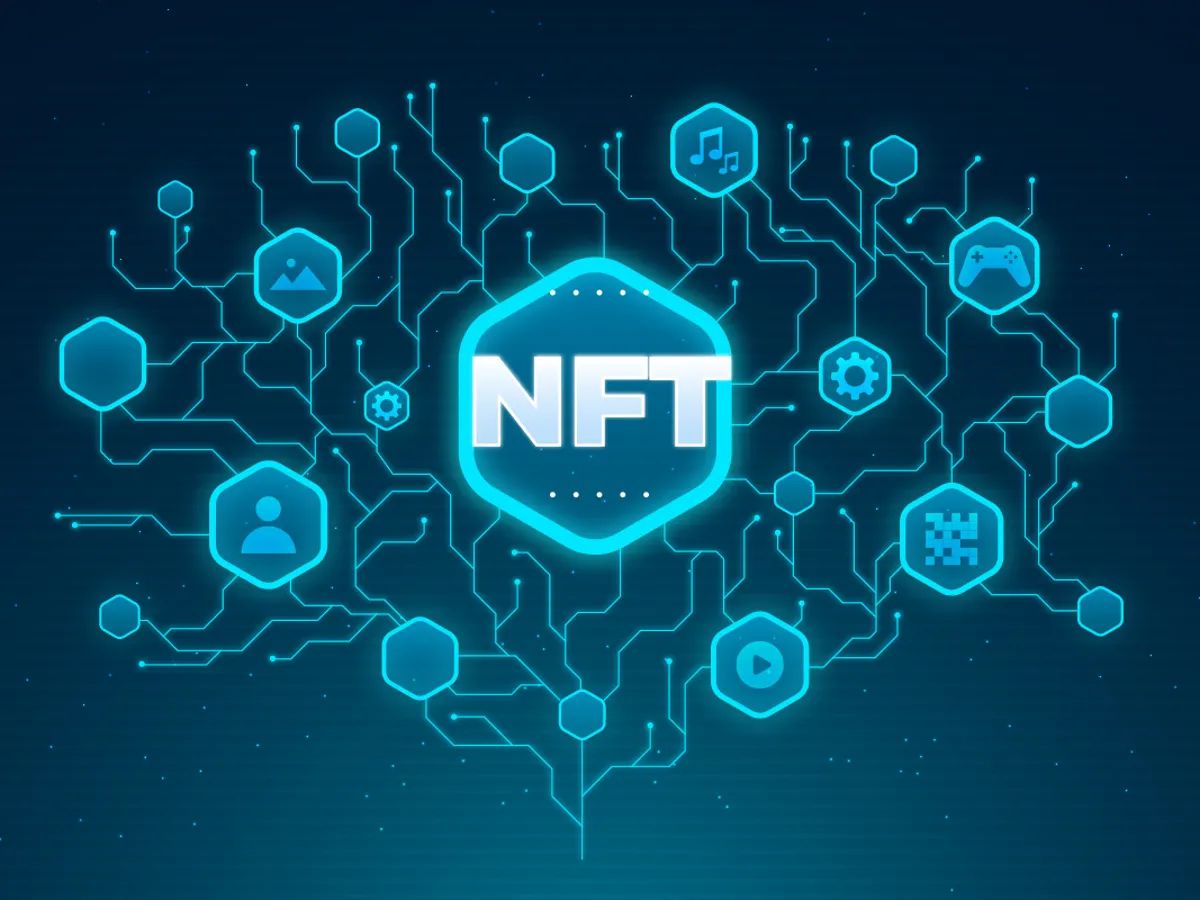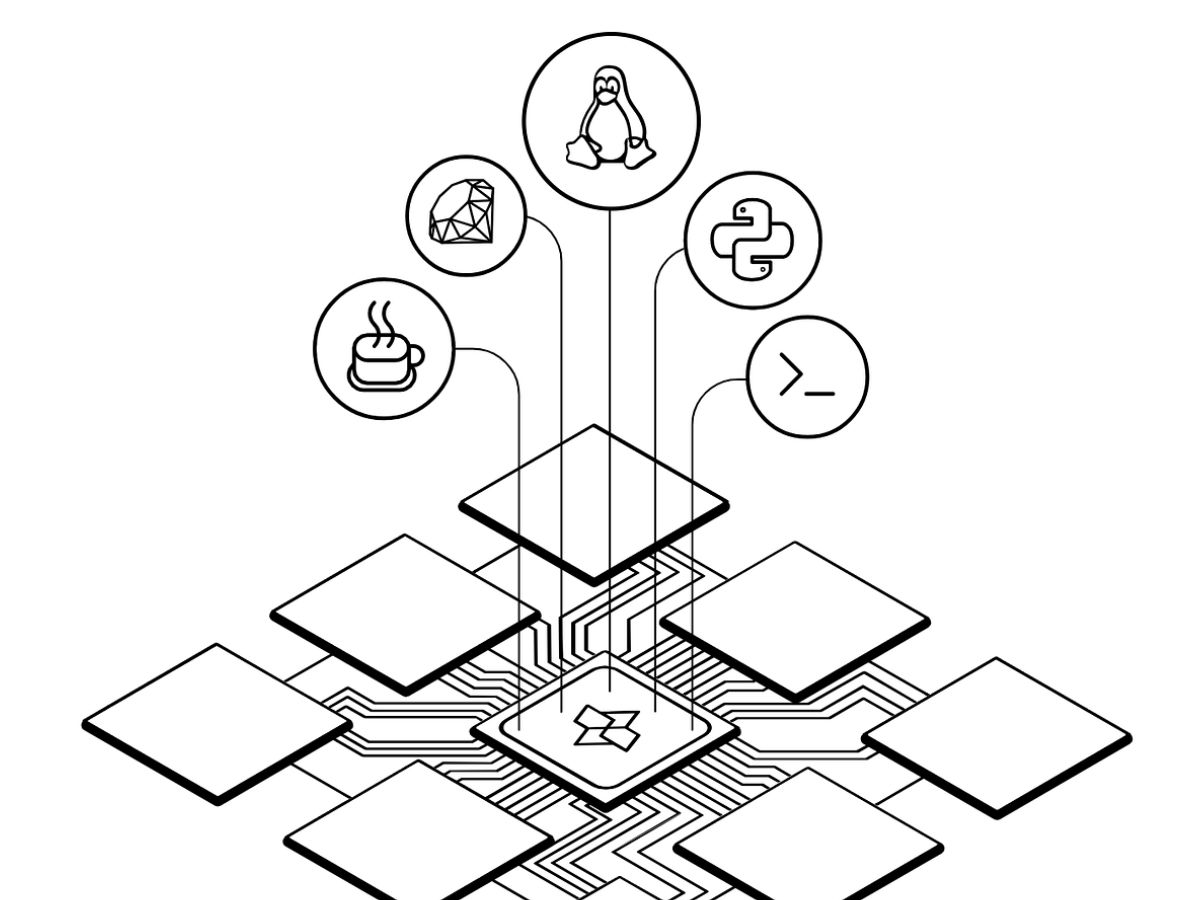Introduction
Welcome to the world of blockchain, a revolutionary technology that is transforming various industries and creating new opportunities. In this digital era, the need for secure, transparent, and decentralized systems has never been greater. Blockchain technology provides a solution by offering a decentralized and immutable ledger that can be used for a wide range of applications.
But what exactly is blockchain? In simple terms, blockchain is a distributed database that maintains a continuously growing list of records called blocks. These blocks are linked together using cryptographic techniques, forming a chain of blocks. Each block contains a timestamp and a reference to the previous block, ensuring the integrity and immutability of the data.
As the adoption of blockchain technology increases, the demand for skilled professionals who can develop and maintain these decentralized systems is also on the rise. This is where blockchain developers come into play. A blockchain developer is a specialized software engineer who has a deep understanding of blockchain technology and is proficient in developing decentralized applications (DApps) and smart contracts.
To be a successful blockchain developer, one needs to possess a unique set of skills and knowledge. These skills include a solid understanding of cryptography, data structures, and algorithms. Additionally, proficiency in programming languages such as Solidity, JavaScript, and Python is crucial for developing smart contracts and DApps.
The responsibilities of a blockchain developer go beyond just coding. They are also involved in security audits, testing, and continuous research to stay updated with the latest advancements in blockchain technology. Let’s delve deeper into the skills required and the roles and responsibilities of a blockchain developer in the following sections.
What is Blockchain?
Blockchain is a transformative technology that has gained immense popularity in recent years. It is essentially a decentralized and distributed ledger that records and verifies transactions across a network of computers. Unlike traditional databases that are centrally controlled, blockchain operates on a peer-to-peer network, making it secure, transparent, and resilient to fraud or tampering.
At its core, blockchain consists of a series of blocks that contain transactional data. Each block is linked to the previous block through cryptographic hashes, forming a chain. This chain of blocks ensures the integrity and immutability of the data stored within the blockchain.
One of the key features of blockchain is its decentralized nature. The blockchain network is collectively maintained by a group of participants, known as nodes, who validate and verify transactions. This eliminates the need for intermediaries, such as banks or government authorities, and allows for direct peer-to-peer transactions.
Another important aspect of blockchain is its transparency. Every transaction recorded on the blockchain is visible to all participants, ensuring accountability and reducing the risk of fraud. This transparency also fosters trust among users, as they can independently verify the validity of transactions.
Blockchain technology has gained popularity primarily due to its application in cryptocurrencies, such as Bitcoin and Ethereum. However, its potential extends far beyond digital currencies. Blockchain can be used in various industries, including finance, supply chain management, healthcare, real estate, and more.
By leveraging blockchain, organizations can streamline processes, increase efficiency, reduce costs, and enhance security. For example, in supply chain management, blockchain can provide a transparent record of each step in the supply chain, ensuring authenticity and preventing counterfeiting. In healthcare, blockchain can securely store and share medical records, ensuring patient privacy and data integrity.
Overall, blockchain technology has the potential to revolutionize the way we conduct transactions and store data. Its decentralized nature, transparency, and security features make it a promising solution for various industries. As the adoption of blockchain continues to grow, it is important for individuals and businesses to understand and leverage its capabilities to stay ahead in this digital era.
Who is a Blockchain Developer?
A blockchain developer is a specialized software engineer who possesses a unique set of skills and knowledge in blockchain technology. They are responsible for designing, developing, and maintaining decentralized applications (DApps), smart contracts, and other blockchain-based solutions.
To become a blockchain developer, one must have a strong understanding of the underlying principles of blockchain technology. This includes concepts such as distributed ledger systems, consensus algorithms, cryptographic techniques, and decentralized networks.
In addition to understanding the theoretical aspects of blockchain, a blockchain developer must also be proficient in various programming languages. Solidity, a language specific to blockchain development, is commonly used for writing smart contracts on platforms like Ethereum. Other programming languages such as JavaScript and Python are also important for developing decentralized applications and interacting with blockchain networks.
A blockchain developer should also possess strong problem-solving and analytical skills. They need to be able to identify and resolve issues related to blockchain development, such as scalability, security, and performance. Being able to think critically and find efficient solutions is essential in this role.
Furthermore, a blockchain developer should be familiar with different blockchain platforms and frameworks. Popular platforms like Ethereum, Hyperledger, and EOS have their own specific features, and being able to work with these platforms is crucial in developing blockchain solutions for different use cases.
As the field of blockchain evolves rapidly, continuous learning and research are essential for a blockchain developer. Staying updated with the latest advancements, emerging trends, and best practices is crucial for delivering efficient and secure blockchain solutions.
In summary, a blockchain developer is a highly skilled professional who possesses in-depth knowledge of blockchain technology, programming languages, problem-solving abilities, and a passion for continuous learning. Their expertise allows them to create innovative blockchain-based solutions that have the potential to transform industries and drive future innovation.
Skills Required to be a Blockchain Developer
Being a successful blockchain developer requires a unique combination of skills and knowledge. In addition to a strong foundation in programming and software development, here are some key skills necessary to excel in this role:
- Cryptography: A solid understanding of cryptographic principles is essential for a blockchain developer. Knowledge of encryption, digital signatures, and cryptographic hash functions is crucial for ensuring the security and integrity of transactions and data on the blockchain.
- Smart Contract Development: Smart contracts, self-executing contracts with the terms of the agreement directly written into code, are a fundamental component of blockchain applications. Proficiency in languages such as Solidity, which is commonly used for developing smart contracts on platforms like Ethereum, is crucial for a blockchain developer.
- Blockchain Platforms: Familiarity with various blockchain platforms and frameworks is important. Popular platforms such as Ethereum, Hyperledger, and EOS have their own unique features and capabilities. Understanding how to work with these platforms and leverage their functionalities is essential for developing blockchain solutions.
- Programming Languages: Proficiency in programming languages such as JavaScript, Python, and C++ is essential for building decentralized applications and interacting with blockchain networks. These languages are widely used in blockchain development and having a strong command of them will make you an efficient developer.
- Data Structures and Algorithms: A solid understanding of data structures and algorithms is valuable in blockchain development. Efficiently managing and processing large amounts of data on the blockchain requires knowledge of algorithmic complexity, data storage mechanisms, and search/sort algorithms.
- Networking and Distributed Systems: Understanding how networks and distributed systems function is crucial for blockchain development. Knowledge of peer-to-peer networking, consensus algorithms, and distributed ledger technologies provides the foundation for creating secure and scalable blockchain solutions.
- Problem-solving and Analytical Thinking: Blockchain developers must possess strong problem-solving and analytical skills. They need to be able to identify potential pitfalls in blockchain design and implementation and find efficient solutions. Attention to detail and an ability to think critically are key traits for a successful blockchain developer.
- Security: Security is a critical aspect of blockchain development. Understanding best practices in securing blockchain systems, implementing secure coding techniques, and conducting security audits and tests are vital skills for a blockchain developer.
Continuously updating your skills and staying informed about the latest developments in blockchain technology is essential for success as a blockchain developer. This field is rapidly evolving, and being adaptable and open to learning is crucial for staying on top of the latest trends and advancements.
By acquiring and honing these skills, you will be well-equipped to tackle the challenges of blockchain development and contribute to the growth and innovation of this transformative technology.
Roles and Responsibilities of a Blockchain Developer
A blockchain developer plays a crucial role in designing, developing, and maintaining blockchain-based solutions. Their responsibilities go beyond just writing code. Here are some key roles and responsibilities of a blockchain developer:
- Designing and Developing Smart Contracts: A significant responsibility of a blockchain developer is to design and develop smart contracts. Smart contracts are self-executing contracts with the terms of the agreement directly written into code. It involves writing code to define the logic and actions that will be executed on the blockchain.
- Building Decentralized Applications (DApps): Blockchain developers are responsible for building decentralized applications (DApps) that run on the blockchain. This includes designing user interfaces, integrating with smart contracts, and ensuring seamless functionality and user experience.
- Interacting with Blockchain Networks: Blockchain developers need to interact with blockchain networks and understand how to perform transactions, deploy contracts, and retrieve data from the blockchain. This requires working with tools, APIs, and libraries specific to the blockchain platform being used.
- Security Audits and Testing: Security is a critical aspect of blockchain development. Blockchain developers are responsible for conducting security audits and testing to identify vulnerabilities and ensure that the blockchain system is secure against potential attacks.
- Ensuring Scalability and Performance: As the blockchain ecosystem grows, scalability and performance become important factors to consider. Blockchain developers need to optimize the performance of the blockchain system and ensure it can handle a large volume of transactions without compromising speed and efficiency.
- Maintaining and Upgrading Blockchain Systems: Blockchain technology is continuously evolving, and developers are responsible for maintaining and upgrading blockchain systems. This includes keeping up with software updates, implementing new features, and addressing any issues that arise.
- Collaborating with Cross-functional Teams: Blockchain projects often involve collaboration with various stakeholders, including business analysts, project managers, and other developers. Blockchain developers need to effectively communicate and collaborate with cross-functional teams to ensure successful project execution.
- Continuous Learning and Research: Blockchain technology is constantly evolving, and blockchain developers need to stay updated with the latest trends, tools, and best practices. Continuous learning and research are crucial to keep pace with this rapidly changing field.
These roles and responsibilities highlight the multifaceted nature of a blockchain developer’s work. It requires a combination of technical skills, problem-solving abilities, attention to detail, and a passion for learning and innovation. By fulfilling these responsibilities, blockchain developers contribute to the growth and advancement of blockchain technology.
Developing Smart Contracts
One of the key responsibilities of a blockchain developer is to design and develop smart contracts. Smart contracts are self-executing contracts with the terms of the agreement directly written into code. They are a fundamental component of blockchain technology, enabling automated and trustless transactions.
Developing smart contracts requires specialized knowledge and skills. Here are some important aspects to consider when developing smart contracts:
- Defining the Contract Logic: The first step in developing a smart contract is defining the contract logic. This involves identifying the conditions, rules, and actions that should be executed when certain events occur. Blockchain developers need to carefully consider the requirements and goals of the contract to ensure accurate and efficient execution of the intended logic.
- Writing Solidity Code: Solidity is the most commonly used programming language for developing smart contracts on platforms like Ethereum. Blockchain developers need to be proficient in Solidity and understand its syntax, data types, and functions. Writing clean and efficient Solidity code is crucial for the proper functioning of the smart contract.
- Implementing Contract Security: Security is of utmost importance when developing smart contracts. Blockchain developers need to implement secure coding practices to prevent vulnerabilities such as reentrancy attacks, overflow/underflow errors, or unauthorized access. They need to follow best practices for secure contract development, such as input validation and proper handling of sensitive data.
- Testing and Debugging: Thorough testing and debugging are essential to ensure the accuracy and reliability of smart contracts. Blockchain developers should conduct comprehensive testing to identify and resolve any potential issues or bugs. This includes unit testing, integration testing, and stress testing to simulate real-life scenarios and validate the contract’s behavior.
- Deploying and Interacting with Contracts: Once a smart contract is developed and tested, it needs to be deployed to the blockchain network. Blockchain developers should be familiar with the deployment process and the tools necessary for contract deployment. They must also know how to interact with deployed contracts, such as calling contract functions or retrieving contract data.
- Auditing and Upgrading Contracts: After deployment, it is essential to conduct security audits to identify any vulnerabilities or potential issues. This ensures that the smart contract is secure and functions as intended. Additionally, as business requirements evolve or improvements are needed, blockchain developers may need to upgrade the smart contract while maintaining compatibility and data integrity.
Developing smart contracts requires a combination of programming skills, security awareness, and attention to detail. Blockchain developers must balance the contract’s functionality, security, and efficiency to create robust and reliable smart contracts. By mastering the art of developing smart contracts, developers contribute to the growth and adoption of blockchain technology.
Building Decentralized Applications (DApps)
Building decentralized applications (DApps) is a significant responsibility of a blockchain developer. DApps are applications that are built on top of blockchain networks, leveraging the decentralized and transparent nature of the technology. Developing DApps involves designing user interfaces, integrating with smart contracts, and ensuring smooth functionality and user experience.
Here are some important aspects to consider when building DApps:
- User Interface Design: A key component of building DApps is designing user interfaces (UI) that are intuitive and user-friendly. The UI should provide a seamless experience for users, allowing them to interact with the DApp and perform various actions. Blockchain developers need to have a strong understanding of UI/UX principles and the ability to create visually appealing and responsive interfaces.
- Integration with Smart Contracts: DApps often rely on smart contracts for executing business logic and storing data on the blockchain. Blockchain developers need to integrate the front-end of the DApp with the corresponding smart contracts, enabling users to interact with the decentralized functionality of the application. This involves connecting the UI with the smart contract functions and handling data retrieval and updates.
- Handling Blockchain Transactions: Since DApps operate on blockchain networks, handling blockchain transactions is a crucial aspect of their development. Blockchain developers need to enable users to initiate transactions, such as sending or receiving tokens, interacting with smart contracts, or updating data on the blockchain. They must implement transaction management mechanisms and handle transaction fees and gas costs.
- Ensuring Data Security and Privacy: Data security and privacy are paramount concerns in any application, and DApps are no exception. Blockchain developers need to implement encryption and access control mechanisms to protect sensitive user data stored on the blockchain. Additionally, privacy-enhancing techniques can be employed to protect the confidentiality of transactions and user identities.
- Testing and Quality Assurance: Thorough testing is essential to ensure the reliability and functionality of DApps. Blockchain developers should perform extensive testing, including unit testing, integration testing, and user acceptance testing, to identify and fix any issues or bugs. Quality assurance processes ensure that the DApp meets the requirements and performs as expected.
- Deployment and Maintenance: After development, DApps need to be deployed to the appropriate blockchain network. Blockchain developers should be familiar with the deployment process, including deploying the smart contracts and the associated front-end components. They also need to provide ongoing maintenance and support, addressing any issues that arise and implementing updates or improvements as needed.
Building DApps requires a combination of technical skills, creativity, and attention to detail. Blockchain developers must understand the unique aspects of building applications on decentralized networks and be able to provide a seamless user experience while leveraging the benefits of blockchain technology. By successfully building DApps, developers contribute to the widespread adoption and usability of decentralized applications.
Security Audits and Testing
Security is a critical aspect of blockchain development, and blockchain developers have the responsibility of conducting security audits and testing to ensure the integrity and robustness of the blockchain system. Security audits and testing help identify vulnerabilities, mitigate risks, and enhance the overall security posture of the system.
Here are some key aspects of security audits and testing in blockchain development:
- Vulnerability Assessments: Blockchain developers perform vulnerability assessments to identify potential security weaknesses within the blockchain system. This involves conducting comprehensive reviews of the codebase, smart contracts, and the overall architecture. By systematically assessing the system, developers can pinpoint potential vulnerabilities and address them proactively.
- Penetration Testing: Penetration testing, also known as ethical hacking, is a method used to evaluate the security of a blockchain system. Skilled blockchain developers simulate real-world attacks on the system to identify any weaknesses or entry points that attackers could exploit. By uncovering vulnerabilities, developers can recommend and implement security measures to mitigate those risks.
- Code Review: Thorough code review is a critical part of security audits. Blockchain developers analyze the codebase to ensure it adheres to secure coding practices, is free from common vulnerabilities, and follows best practices for secure blockchain development. This includes checking for potential issues such as buffer overflows, improper input validation, or insecure dependency usage.
- Smart Contract Audits: Smart contracts are a vital component of blockchain applications, and auditing them for security vulnerabilities is crucial. Blockchain developers conduct smart contract audits to identify any potential vulnerabilities, including logic flaws or coding errors that could lead to exploits or financial losses. Auditing smart contracts at the code level helps ensure the contracts function as intended and are resistant to attacks.
- Network Security: Blockchain developers also focus on network security to protect the integrity and confidentiality of transactions and data. They implement secure communication protocols, encryption techniques, and access control mechanisms to prevent unauthorized access or tampering of data on the blockchain network. Network security measures contribute to the overall protection of the blockchain system.
- Regular Testing and Monitoring: Security testing is an ongoing process in blockchain development. Blockchain developers continuously test and monitor the system to identify emerging threats and vulnerabilities. They employ tools and techniques like fuzzing, threat modeling, and anomaly detection to ensure the system remains secure over time.
By conducting thorough security audits and testing, blockchain developers play a crucial role in protecting the integrity and security of the blockchain system. Their efforts help in creating robust, secure, and trustworthy blockchain solutions that can be trusted by users and organizations alike.
Continuous Learning and Research
Continuous learning and research are paramount for blockchain developers to stay at the forefront of this rapidly evolving field. As blockchain technology continues to advance, developers must constantly update their knowledge and skills to adapt to new trends, tools, and best practices.
Here are some key reasons why continuous learning and research are crucial for blockchain developers:
- Emerging Technologies and Frameworks: The blockchain ecosystem is constantly expanding, with new technologies and frameworks being introduced regularly. By staying updated, developers can leverage these advancements to build more efficient and scalable blockchain solutions. This includes learning about emerging blockchain platforms, consensus mechanisms, and scalability solutions.
- Security Updates and Best Practices: Security is a critical aspect of blockchain development. Continuous learning ensures that developers are aware of the latest security vulnerabilities and best practices for secure blockchain coding. By staying informed, developers can implement the most effective security measures to protect the blockchain ecosystem and its users.
- Industry Use Cases: Blockchain technology is being adopted across various industries, each with its own unique requirements and challenges. Continuous learning allows developers to explore different use cases and understand how blockchain can be applied in diverse fields such as finance, supply chain management, healthcare, and more. This knowledge helps in designing tailored blockchain solutions for specific industry needs.
- Researching New Algorithms and Techniques: Blockchain technology relies heavily on cryptography and distributed systems. Continuous learning and research enable developers to explore new cryptographic algorithms, consensus mechanisms, and data storage techniques. By understanding these innovations, developers can optimize their blockchain solutions for improved performance, security, and scalability.
- Community Engagement: The blockchain community is vibrant and dynamic, with active discussions, forums, and developer communities. Continuous learning involves actively participating in these communities, sharing knowledge, and exchanging ideas. Engaging with the blockchain community helps developers to stay up to date with the latest developments and gain insights from other experts in the field.
- Experimentation and Innovation: Continuous learning encourages developers to experiment with new ideas and explore innovative approaches to blockchain development. It fosters a creative mindset and encourages problem-solving from different angles. By continuously learning and researching, developers can push the boundaries of blockchain technology and contribute to its ongoing evolution.
Continuous learning and research are not only essential for individual growth as a blockchain developer, but also for the advancement of the entire blockchain ecosystem. By embracing new knowledge, technologies, and research, developers can contribute to the development of more secure, scalable, and innovative blockchain solutions that drive the widespread adoption of this transformative technology.
Conclusion
Being a blockchain developer requires a unique skill set and a deep understanding of blockchain technology. From developing smart contracts to building decentralized applications, blockchain developers play a crucial role in shaping the future of various industries.
Throughout this article, we have explored the key aspects of blockchain development, including the definition of blockchain technology, the roles and responsibilities of blockchain developers, and the skills required to excel in this field.
Blockchain developers must possess a solid foundation in programming and software development. They need to be proficient in languages such as Solidity, JavaScript, and Python, and have a deep understanding of cryptography, data structures, and algorithms.
Additionally, blockchain developers are responsible for various tasks such as designing and developing smart contracts, building decentralized applications, conducting security audits and testing, and engaging in continuous learning and research.
Continuous learning and research are critical for blockchain developers to stay updated with the latest advancements, security measures, and industry use cases. By embracing continuous learning, blockchain developers can innovate, improve security, and contribute to the evolution of blockchain technology.
In conclusion, being a blockchain developer is an exciting and challenging profession. With the right skills, knowledge, and commitment to continuous learning, blockchain developers can make a significant impact in the world of decentralized systems and drive the adoption of this revolutionary technology.

























